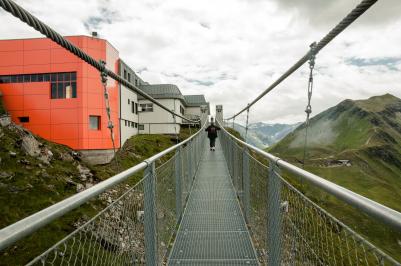The Birth of “Suspension” from issue 299.2
When I was twenty-four and very poor and still far from sure of myself as a writer, I fell for a woman almost twice my age. D. was a Californian, a professor’s ex-wife who found herself living alone on a farm outside the small town where I was in grad school.
I’d noticed D. many times—looking too cool as she sipped whiskeys and puffed Camels in the main street bars. But it wasn’t until the winter of my final year that anything between us sparked. We got to chatting at a friend’s dinner party. We talked about her past (college and grad school in L.A.; six years in London and Marseille with her ex). We talked about her favorite artists (Twombly and DeKooning). After a few hours, and too many glasses of boxed red wine, we found ourselves alone on the porch. It was November and bitter cold. Somehow D. came up with a blanket. She covered our legs and took my hand. Within seconds, we were kissing.
“Is this happening?” I asked, thinking aloud. “I mean, are we just gonna do this right here?”
A minute later, we left separately, and I met her down the block.
"Don’t. Tell. Anyone,” D. said, each word punctuated by a poke to my sternum. “God,” she whispered. “This Podunk town. Can you even imagine the scandal?”
I could, I thought, and I loved it.
For the next few months, I went to D.’s once a week. I was to arrive after dark and tell no one. I’d bring cheap wine and an armful of groceries, and we’d cook dinner: salmon in parchment, shrimp and grits, gumbo once for Mardi Gras day. Naturally, much of our bond was physical. I’d been two years without a girlfriend, and to make matters worse, my MFA program had forbidden us from dating any of the immediate vicinity’s thousand or so all-too-nubile undergrads. Nor did it hurt that D. was a knockout: tall and lithe, with full lips and curly blonde hair. Twenty years prior, as a student at U.C.L.A., she’d modeled for magazines and been in commercials.
But it was more than D.’s good looks that made my time with her so attractive. The Recession by then was on overdrive. Landing a teaching job had gone from unlikely to hopeless. For the first time ever, I didn’t know what came next. Our relationship, then, was a welcome distraction. For a few hours a week, I could pretend that all was pleasant and stable. My time with D. made me feel like a grownup—like in spite of the uncertainty in which I was drowning, I’d still managed to move forward. Somehow this gorgeous woman—this bona fide adult—had taken a shining to me. Maybe, just maybe, I was becoming a man.
We had great nights together, D. and me. We told stories, gossiped, held hands and laughed. And while it was lovely, it was never quite perfect. Both of us knew this couldn’t get serious. D. was still sore from her divorce. Men were all-in one minute, she said, and then ready for something better the next. And besides, no matter what happened, come May, I’d graduate and be gone forever. But, hey, I insisted, let’s take it easy. We could make this work. Flings like these always seem so right. But then you get attached. And then of course comes the strain.
During those tougher times, the tense dinners when we’d philosophize over whether our relationship, or whatever you called it, was worth it, I began to see D. for her frustration. Here was a woman, I thought, so talented and smart and beautiful—and yet so stuck. She was trapped in a town filled with bad memories and people who didn’t get her. She was tired and angry and sad. Whatever happiness I gave her would soon enough be gone. The more I struggled to justify our weekly dates, the more I saw that I wanted simply to help her, to do for her what she’d done for me: make life more pleasant, less bleak.
But, of course, I couldn’t. At least not in real life.
For the rest of that spring, as my relationship with D. sputtered and died, I made up for my own limitations by beginning work on the story that would come together after years of revision to become “Suspension.” At its heart were Russell and Janet, a sympathetic pair who very well might’ve been something if not for an unbridgeable gap in age. Russell was plainly me; his struggles, at their core, were mine. Back then, my life, like his, was in a period of prolonged suspension. I was between worlds, waiting, on the very cusp of leaving the comfort I’d known and starting anew—for better or for worse. But just before I’d taken the plunge, I found myself presented with D., my Janet, the beautiful but blue outsider stuck in a place that did not suit her. Like me, Russell was often crushed by confusion. Like D., Janet’s beauty and exuberance was at times clouded by her unwillingness to move on. Like all of life, much of what happened between us was disappointing. But at least everyone learned something.
“Suspension” is my ode to D.—to those few months when my fears of the future were assuaged by the allure of a mysterious older woman. There is, of course, more to it. There’s the property in San Antonio, where I worked manual labor for years to sustain myself over the summers. There is my own parent’s divorce, the mysteries of their lives before I was born. There’s tennis and bee keeping. But D. is what made “Suspension.” She is my story’s heart.
Recommended
Nor’easter
Post-Op Appointment With My Father
Cedar Valley Youth Poet Laureate | Fall 2024 Workshop






